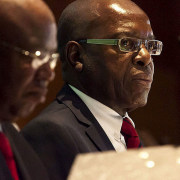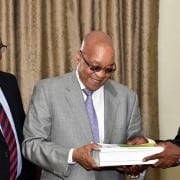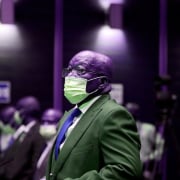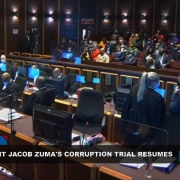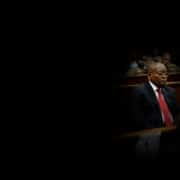|
Getting your Trinity Audio player ready...
|
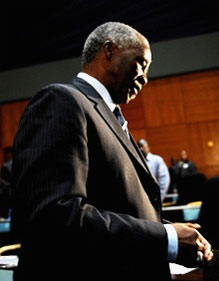
By Lee-Ann Alfreds
Former president Thabo Mbeki returned to the limelight after almost six years in virtual seclusion to deny there had been anything untoward in the 1999 arms deal.
Testifying before the Arms Procurement Commission – which is probing allegations of fraud and corruption in the controversial deal – Mbeki insisted there was no evidence that anyone received a bribe. “There is absolutely no evidence of bribery in terms of people involved in the processing of the acquisition,” he testified. “We've been waiting for concrete facts.”
Responding to cross-examination by Paul Hoffman who was representing arms critic Terry Crawford-Browne about whether he was aware British company BAE admitted that it had paid commissions, which he said were bribes, to South African officials, Mbeki said he was not aware.
He also insisted that no cabinet ministers had acted in their personal capacities and that the cost had always been a consideration. The deal was said to cost R30-billion at the time it was signed, but has since ballooned to an estimated R72-billion.
Mbeki headed up the cabinet sub-committee which oversaw the arms deal. “It is important to make the point that none of the members of the inter-ministerial committee acted in their personal capacities when executing the functions as members of the executive,” Mbeki testified in response to cross-examination by Hoffman.
He later testified during cross-examination by Lawyers for Human Rights advocate Anne-Marie de Vos that the government did not think the deal was unaffordable despite an affordability report which outlined a number of risks.
“As government, we thought the decision was very rational,” Mbeki testified. “The affordability report was provided…. The decision was rational.”
Mbeki said the inter-ministerial committee and the cabinet had canvassed the report. “Government thought it could manage the risk,” he said.
Mbeki had earlier indicated the government was fully aware of criticism on spending on weapons while the country needed reconstruction and development, but insisted “all views” had been taken into account.
In response to a question by Hoffman about whether he knew then defense minister Joe Modise had instructed his department's committee to disregard costs as consideration, Mbeki insisted “at no point did the inter-ministerial committee consider anything without taking into consideration the issue of cost, because you need to pay for everything”.
Mbeki insisted he knew nothing about the alleged instruction by Modise. “We did not sit in departmental meetings. We sat as the inter-ministerial committee and this matter did not come up.”
Mbeki also pointed out that several investigations had probed the deal and had never concluded any irregularity existed. "To this day, allegations are aplenty. You could fill books. But where is the evidence?" he asked.
Former finance minister Trevor Manuel, former defense minister Mosiuoa Lekota and former public enterprises minister Alec Erwin who have all testified before the commission, supported Mbeki.


